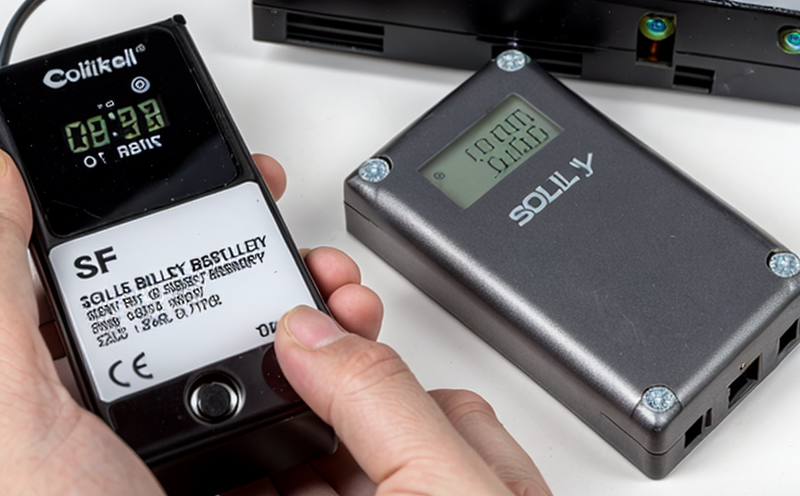IEC 62619 Solid-State Battery Safety and Reliability Testing
The International Electrotechnical Commission (IEC) standard IEC 62619 provides a comprehensive framework for the safety and reliability testing of solid-state batteries. These batteries are gaining significant traction in various sectors, including automotive, electronics, and consumer goods, due to their enhanced energy density, improved safety profile, and longer lifespans compared to traditional lithium-ion cells.
Solid-state batteries utilize a solid electrolyte instead of the liquid or polymer gel used in conventional battery designs. This innovation significantly reduces the risk of fire and explosion by eliminating flammable components. The IEC 62619 standard ensures that these advanced batteries meet stringent safety, performance, and durability requirements through rigorous testing.
The testing protocol outlined in IEC 62619 covers a wide range of critical parameters, including mechanical stress tests, thermal cycling, accelerated aging, and high-temperature stability checks. This comprehensive approach guarantees that the solid-state battery is reliable under real-world conditions while maintaining its safety standards throughout its lifecycle.
For quality managers and compliance officers, adhering to IEC 62619 ensures that your organization meets international regulatory requirements. For R&D engineers, this standard provides a robust foundation for developing new products and refining existing designs. Procurement teams will benefit from knowing that the batteries they source comply with rigorous safety and reliability benchmarks.
The testing process involves precise specimen preparation and careful instrumentation to ensure accurate results. Specimens are subjected to various environmental conditions to simulate real-world usage scenarios, including extreme temperatures, humidity levels, and mechanical stress. The data collected during these tests is meticulously analyzed using advanced software tools to determine compliance with IEC 62619 standards.
By leveraging the expertise of our laboratory, you can gain confidence in your solid-state battery's safety and reliability. Our team of experienced engineers employs state-of-the-art equipment and follows strict protocols to conduct these tests accurately and efficiently. The comprehensive reports we provide will help you make informed decisions about product development, quality assurance, and regulatory compliance.
Our testing services for IEC 62619 go beyond just meeting standards; they also offer valuable insights into potential improvements and areas of focus for your product lifecycle. This proactive approach ensures that your solid-state batteries not only comply with current regulations but are also prepared for future challenges in the rapidly evolving battery technology landscape.
With our expertise, you can rest assured that your solid-state batteries will withstand rigorous testing while maintaining their safety and reliability. Our commitment to excellence and adherence to international standards sets us apart as a trusted partner for quality assurance and compliance.
Why Choose This Test
- Ensures compliance with international standards
- Guarantees safety under real-world conditions
- Provides robust data for informed decision-making
- Maintains reliability throughout the battery's lifecycle
- Offers valuable insights into potential improvements
- Supports proactive product development and refinement
- Reduces risks associated with non-compliant products
- Enhances reputation through adherence to rigorous testing protocols
Environmental and Sustainability Contributions
The IEC 62619 standard plays a crucial role in promoting environmental sustainability by ensuring that solid-state batteries are safe, reliable, and long-lasting. By minimizing the risk of fire and explosion through advanced design and testing, these batteries contribute positively to public safety and reduce waste associated with premature failure.
Manufacturers who adhere to IEC 62619 can demonstrate their commitment to sustainability by offering products that are both safe and environmentally responsible. This not only enhances brand reputation but also attracts environmentally conscious consumers and partners.
The testing process itself contributes indirectly to environmental sustainability by identifying potential issues early in the development cycle, thus preventing costly reworks and minimizing material waste. By ensuring that solid-state batteries meet high safety standards, this standard helps promote a more sustainable future for battery technology.
Use Cases and Application Examples
Solid-state batteries are poised to revolutionize various industries due to their superior performance characteristics. Automotive manufacturers can leverage these batteries to enhance vehicle safety and efficiency by providing longer driving ranges with reduced weight. In consumer electronics, solid-state batteries offer thinner devices with extended battery life.
Electronics companies benefit from the enhanced durability of solid-state batteries, which are less prone to damage during transport or use. Medical device manufacturers can utilize these batteries for critical applications where reliability and safety are paramount. Aerospace and defense sectors also stand to gain from the improved performance and reduced weight of solid-state batteries.
By conducting rigorous testing according to IEC 62619, organizations ensure that their solid-state batteries meet the highest safety and reliability standards. This not only enhances product quality but also fosters trust among customers and stakeholders, driving long-term success in competitive markets.





